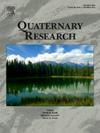维诺萨的洛雷托旧石器时代下层遗址(意大利巴西利卡塔省)现有考古和地质年代数据的更新与综述
IF 1.8
3区 地球科学
Q3 GEOGRAPHY, PHYSICAL
引用次数: 0
摘要
在意大利南部的巴西利卡塔大区,维诺萨的洛雷托旧石器时代下层遗址因是欧洲西南部最早 出现阿切莱文化的地方之一而闻名,该遗址距离标志性的诺塔奇里科遗址不到一公里, 距离阿特拉西米特罗不到 25 公里。对洛雷托遗址的研究并不像对其他两个遗址那样深入,尽管在维诺萨盆地进行了地质调查,但在发掘活动中发现的三个考古层从未公布过直接的年代数字。我们介绍了一种结合 ESR/U 系列、ESR 和 40Ar/39Ar 许可的多方法地质年代方法,以完善洛雷托遗址最古老考古层(A)的年代。这些数据使我们能够根据之前基于地质学和古生物学数据的假设,提出该层的 MIS 13 年龄。我们还建议对维诺萨国家考古博物馆收藏的石器进行技术审查,以便将洛雷托纳入欧洲阿切乌来技术复合体出现和扩散的演化方案中。本文章由计算机程序翻译,如有差异,请以英文原文为准。
Update and synthesis of the available archaeological and geochronological data for the Lower Paleolithic site of Loreto at Venosa (Basilicata, Italy)
In the Basilicata region, located in southern Italy and known for hosting among the first occurrences of the Acheulean culture in southwestern Europe, the Lower Paleolithic site of Loreto at Venosa is located less than a kilometer from the emblematic site of Notarchirico and less than 25 km from Cimitero di Atella. The Loreto site has not been studied as thoroughly as the two other sites and, although geological investigations have been carried out in the Venosa basin, no direct numerical dating has ever been published for the three archaeological levels brought to light during the excavation campaigns. We present a multi-method geochronological approach combining ESR/U-series, ESR, and 40 Ar/39 Ar permitting to refine the age of the most ancient archaeological level (A) of the Loreto site. These data allow us to propose an MIS 13 age for this level, in accordance with previous hypotheses based on geological and paleontological data. We also propose a technical review of the lithic tools preserved in the collection of the National Archaeological Museum of Venosa to integrate Loreto in the evolution scheme of the European Acheulean techno-complex emergence and diffusion.
求助全文
通过发布文献求助,成功后即可免费获取论文全文。
去求助
来源期刊

Quaternary Research
地学-地球科学综合
CiteScore
4.70
自引率
8.70%
发文量
57
审稿时长
3 months
期刊介绍:
Quaternary Research is an international journal devoted to the advancement of the interdisciplinary understanding of the Quaternary Period. We aim to publish articles of broad interest with relevance to more than one discipline, and that constitute a significant new contribution to Quaternary science. The journal’s scope is global, building on its nearly 50-year history in advancing the understanding of earth and human history through interdisciplinary study of the last 2.6 million years.
 求助内容:
求助内容: 应助结果提醒方式:
应助结果提醒方式:


